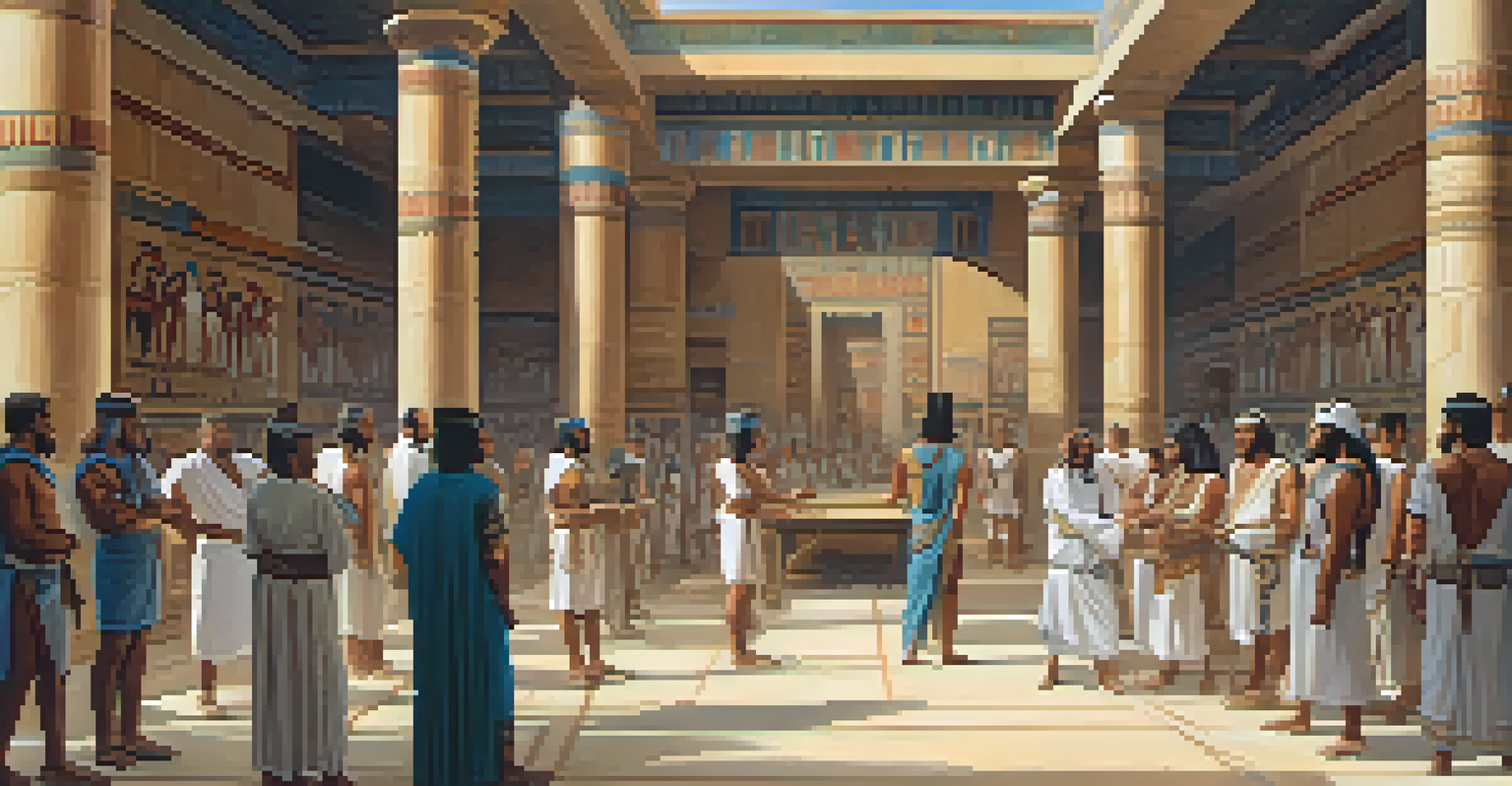The Role of Self Defense in Ancient Egyptian Society and Culture

Understanding Self Defense in Ancient Egypt
Self-defense in ancient Egypt was not merely a concept, but a vital part of daily life. It encompassed various practices, from martial training to legal rights. The Egyptians believed in the importance of protecting oneself and one's family, reflecting a broader cultural emphasis on strength and security.
The greatest defense is not a strong offense; it's a deep understanding of one's own rights and responsibilities.
The need for self-defense arose from the threats posed by rival tribes and potential invaders. As a civilization that thrived along the Nile, ancient Egyptians faced challenges not only from nature but also from human adversaries. This led to the development of techniques and philosophies around self-protection, integral to their way of life.
Moreover, self-defense was intertwined with the Egyptian worldview, which emphasized order (Ma'at) over chaos. This balance influenced their approach to personal safety, reinforcing the idea that defending oneself was both a duty and a means to uphold social harmony.
Martial Arts and Training Practices
Martial arts played a significant role in ancient Egyptian society, with various forms of combat training available. Young men, particularly those from noble families, often received instruction in hand-to-hand combat and weaponry. This training not only prepared them for battle but also instilled a sense of discipline and confidence.

One of the most notable martial skills was the use of the khopesh, a sickle-shaped sword that symbolized both power and authority. Mastering such weapons was seen as a rite of passage, reinforcing the cultural value placed on strength and preparedness. Through these practices, individuals learned effective techniques for defending themselves and their communities.
Self-Defense was Essential in Egypt
Self-defense was a vital part of daily life in ancient Egypt, reflecting the civilization's emphasis on strength and security.
Additionally, physical prowess was celebrated in Egyptian art and literature, demonstrating the societal admiration for warriors. These depictions served as both inspiration and a reminder of the importance of being ready to protect oneself and others.
The Role of Women in Self Defense
While often overshadowed by male warriors, women in ancient Egypt also played a crucial role in self-defense. They were not only responsible for protecting their homes but were also trained in various forms of combat. Historical records suggest that women could inherit property and, in some cases, wield weapons, reflecting a unique aspect of their societal status.
Self-defense is not just a right; it's a moral duty to protect oneself and those we love.
Women in the upper classes, particularly, had more access to martial training and could participate in self-defense practices. This empowerment was vital in ensuring their safety and the safety of their families, showcasing a balance between traditional gender roles and the necessity of self-protection.
Moreover, the depiction of strong female figures in mythology, such as the goddess Sekhmet, further illustrates the cultural significance of women as protectors. These representations served as symbols of strength and resilience, empowering women in both myth and reality.
Legal Aspects of Self Defense
The legal framework surrounding self-defense in ancient Egypt was quite progressive for its time. The concept of defending oneself against an aggressor was recognized and codified in their laws. This allowed individuals to seek justice and protection under the legal system, reinforcing the importance of safety and order in society.
In situations where self-defense was necessary, the actions taken were often evaluated within the context of intent and necessity. Ancient Egyptians believed that if a person acted in self-defense, they were justified in their actions, provided it was a proportional response to the threat faced.
Women Played Key Roles in Defense
Women in ancient Egypt were empowered to protect their homes and families, showcasing a balance between traditional roles and the necessity of self-defense.
This understanding of legal self-defense not only provided a sense of security for individuals but also helped maintain social order. By legitimizing the right to protect oneself, it encouraged citizens to stand against violence while promoting a culture of accountability.
Self Defense in Religious Context
Religion played an essential role in shaping attitudes towards self-defense in ancient Egypt. The Egyptians believed that the gods protected justice and order, and invoking divine support was a common practice during conflicts. This spiritual element reinforced the idea that self-defense was not just a physical act but also a moral imperative.
Rituals and prayers for protection were commonplace, with individuals often seeking guidance from gods like Horus, the protector of the pharaohs. These spiritual practices provided a sense of comfort and security, allowing people to feel fortified in their ability to defend themselves.
Additionally, the link between self-defense and divine favor can be seen in the artwork and inscriptions of the time. Many depicted warriors invoking the gods before battle, illustrating the belief that divine protection was crucial in their fight for safety and justice.
Self Defense in Warfare
Warfare in ancient Egypt was a significant aspect of self-defense, as the nation often faced external threats. The military was well-organized and trained to protect the realm against invasions. Soldiers were equipped with advanced weapons and tactics, showcasing the importance placed on preparing for conflict.
The pharaohs, as both political and military leaders, played a pivotal role in shaping defense strategies. Their leadership was essential not only in planning battles but also in motivating troops to defend their land. This relationship between leadership and defense was vital to the survival and prosperity of ancient Egypt.
Legal Framework Supported Self-Defense
Ancient Egyptian laws recognized self-defense as a justified action, reinforcing safety and social order within their society.
Moreover, the need for self-defense in warfare led to the development of fortified cities and strategic alliances. These measures provided additional layers of protection, reflecting the comprehensive approach Egyptians took to ensure their safety against various threats.
Cultural Legacy of Self Defense
The legacy of self-defense in ancient Egyptian society continues to influence modern perceptions of personal safety. The principles established during this time, such as the importance of preparation and the right to protect oneself, resonate today. This historical context helps us understand how self-defense has evolved over the centuries.
Art and literature from ancient Egypt often depicted ideals of strength and protection, which serve as a reminder of the cultural values surrounding self-defense. These depictions not only reflect societal beliefs but also inspire contemporary discussions on personal safety and empowerment.

In essence, the lessons learned from ancient Egyptian practices of self-defense remain relevant. They encourage a continuous dialogue about safety, justice, and the empowerment of individuals to stand up for themselves and their communities.